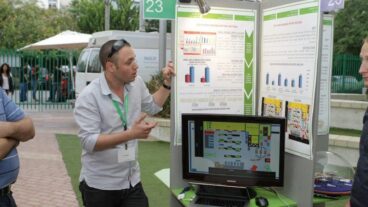‘Sensitivity and selectivity are the two important issues’ to detecting a biological agent, says BAS CEO Alex Keinan.It’s a 24-like scenario. Terrorists are attempting to dump anthrax into the ventilation system of a shopping mall. For homeland security officials, early detection is the most important aspect of containing the biological agent and minimizing any injury.
And that’s where the BAS101 comes in – a biodetector for real-time bioterrorism detection. Developed by Israeli startup Biological Alarm Systems Ltd., the BAS101 is a high performance, selective compact alarm system for the continuous rapid detection of biological hazards in public places.
According to the company’s founder and chief scientist Alex Keinan, as biological terrorism and warfare become increasingly more sophisticated, creating an advanced, global, early detection system is essential for effective homeland security.
“The only solution against bioterror is a real time solution – to know immediately that someone has dispersed a bacteria. Our system works non-stop giving real time alerts,” Keinan told ISRAEL21c from the offices of the company which operates out of GreenTech, the environmental division of the Mofet B’Yehuda Technological and Business Incubator.
“The problem today is that there are no tools, instruments or systems that allow for on-the-spot detection of bacteria. There is technology similar to smoke detectors which can alert you that there is a threat,” he said.
“Let’s assume that a mall or a conference hall is using this type of smoke detector device and it goes off. First of all, you don’t know if it’s a false alarm. In order to understand what the threat is – which biological agents we’re talking about – there’s a need to take a sample to a lab. And only then, after the sample is assessed, can a final decision be made as to whether there is indeed a threat or if it’s a false alarm. This is an involved process which takes time, and time is not something that we have,” the veteran electrical engineer added.
The BAS biological detection system is stationed on-site for continuous monitoring and is designed to work much like a ‘smoke detector’, but for pathogens. This early-detection, real-time system is targeted mainly for civil applications, in which the public is at high risk of exposure to covert releases of bio-agent, such as office complexes, convention centers, train stations, airports, malls, underground subways, and hospitals.
According to Keinan, the BAS101 is fast, selective, has a high degree of sensitivity and works continuously. Its compact size (10 pounds), short response time, and low maintenance make it extremely cost effective.
“Sensitivity and selectivity are the two important issues. You only need a very small amount of a biological agent to cause great damage, so the monitor has to be extremely sensitive.
“On the other hand, you have to reduce the possibility of false alarms. There’s a tiny amount of biological hazardous material in the air naturally – it’s called ‘background noise’ – so you don’t want your system to overreach at this level. The BAS101, we believe, has the right balance of sensitivity and selectivity,” he said.
BAS101 monitors the airborne particles and collects them into a reception unit.
The particles are transferred to a biological unit that selectively traps only the relevant dangerous bacteria.
“Not only can the BAS alert you to airborne biological threats on the spot, but within minutes, it gives a definitive answer of whether it’s anthrax or another biological hazard. Therefore action can be taken immediately without the need to wait for the results from the lab,” said Keinan.
“There are other systems that can provide on-the-spot ID, but they’re extremely expensive and bulky – we’re talking $50,000 and up. Companies like Lockheed Martin are producing systems like this mainly for use in field monitoring for military purposes. But as far as civil applications, it’s out of the question for a mall or a commercial building to buy and install a system like that,” he added.
Keinan, who immigrated to Israel from the former Soviet Union in 1974, has been involved with startups and developments of new technologies from the get go.
“Since I was 16, I’ve been coming up with inventions – things like security systems and communications systems,” he said.
“Alex is a serial inventor,” confirmed Simon Berkovich, a marketing and business consultant who is aiding BAS in locating investors. “He’s been active in Israeli incubator projects since the early 1990s when the whole incubator program got off the ground.”
Keinan devised the concept of the BAS101 about three years ago, and using his own capital developed the idea.
“After I saw that the idea had potential, I approached the Chief Scientist’s Office with a request, and was placed in the Mofet Yehuda incubator program, where we founded the company and have been working for a year and a half with six employees,” said Keinan.
In that time period, the company has developed a fully operational pilot system which enables it to demonstrate proof of concept.
“Of course, we can’t demonstrate with a hazardous chemical like anthrax, so we demonstrate with a non-hazardous agent. But it doesn’t matter, you can see by the main operation route of the system how it works. And if it works for a non-hazardous agent, it will work for a hazardous one.”
According to Berkovich, BAS is in contact with many companies in the US and Europe, and Keinan has been summoned to give a presentation to officials at GE next month.
“In order to bring the system to market, we’ll need to establish a partnership with a major international company. Without that, it will be difficult to find the funding to conduct tests,” said Keinan.
But the serial inventor is confident that his latest development will eventually find its way into the malls and airports of America. And by then, he’ll be on to the next big invention.












